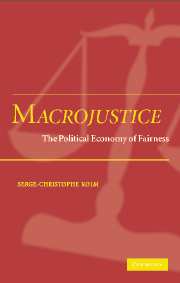Book contents
- Frontmatter
- Contents
- Presentation
- PART ONE BASES: CONSENSUS, FREEDOMS, AND CAPACITIES
- 1 Macrojustice: An overview of its place, method, structure, and result
- 2 Social freedom
- 3 The liberal theory
- 4 Free and equal in rights
- 5 Resources
- 6 Capacities
- PART TWO OVERALL DISTRIBUTIVE JUSTICE: ELIE (EQUAL LABOUR INCOME EQUALIZATION)
- PART THREE COMPARISONS WITH POLICIES AND PHILOSOPHIES
- PART FOUR THE DEGREE OF COMMUNITY, EQUALITY, RECIPROCITY, AND SOLIDARITY
- PART FIVE COMPARISON WITH ECONOMICS' SOCIAL ETHICS
- References and bibliography
- Index
5 - Resources
Published online by Cambridge University Press: 31 July 2009
- Frontmatter
- Contents
- Presentation
- PART ONE BASES: CONSENSUS, FREEDOMS, AND CAPACITIES
- 1 Macrojustice: An overview of its place, method, structure, and result
- 2 Social freedom
- 3 The liberal theory
- 4 Free and equal in rights
- 5 Resources
- 6 Capacities
- PART TWO OVERALL DISTRIBUTIVE JUSTICE: ELIE (EQUAL LABOUR INCOME EQUALIZATION)
- PART THREE COMPARISONS WITH POLICIES AND PHILOSOPHIES
- PART FOUR THE DEGREE OF COMMUNITY, EQUALITY, RECIPROCITY, AND SOLIDARITY
- PART FIVE COMPARISON WITH ECONOMICS' SOCIAL ETHICS
- References and bibliography
- Index
Summary
THE GENERAL PROBLEM
Resources are to be distributed (acquiescing to particular “natural” or “spontaneous” allocations is to be seen as particular possible solutions). From the general principle or method of endogenous social choice, this distribution will have to follow unanimous informed and reflective opinions intervening directly or indirectly (reasons for respecting basic freedoms can also be directly valued). The distribution concerning macrojustice is considered here. Hence, as we have seen, it will have to respect basic rights and process-freedom, Pareto efficiency, and other applications of the principle of unanimity. These criteria will turn out to allocate a number of rights in resources to particular individuals and to discard others from the concern of macrojustice. In the end, there will remain the rent-rights in productive capacities, which will be allocated according to the appropriate equality.
This outcome will result from a selection in each of four dichotomies. (1) Resources can be produced or given (nonproduced or “natural”). (2)They can be nonhuman or human, that is, capacities. (3)Capacities can be (roughly) eudemonistic (and consumptive) or productive (usable in production). (4) Rights in a resource can be rights to use and benefit from the use, or rights to the value of its a priori availability or rent.
The reason for the selection will be process-freedom for dichotomies (1) and (4). It will be the fact that the topic is macrojustice for dichotomies (2) and (3), but for different specific reasons: the large relative importance of capacities and specificities of the allocation of nonhuman natural resources for choice (2), and the consensual irrelevance of eudemonistic (and properly consumptive) capacities for choice (3).
- Type
- Chapter
- Information
- MacrojusticeThe Political Economy of Fairness, pp. 82 - 89Publisher: Cambridge University PressPrint publication year: 2004



